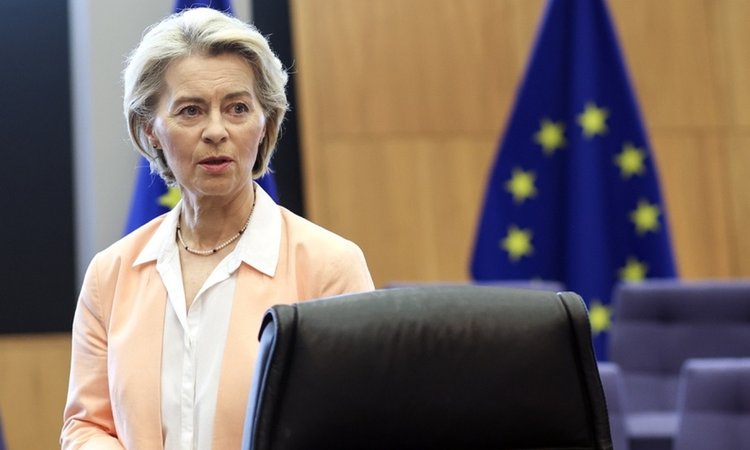EU pauses retaliatory tariffs against US to 'give negotiations a chance'
08:28 - 11 April 2025

The counter-tariffs agreed by EU countries were set to target almost €21 billion in American products, such as soybeans, copper and motorbikes.
The European Union has temporarily paused its counter-tariffs against the United States to further pursue talks with Donald Trump's administration on how to resolve what, until a few hours ago, was shaping up to be an all-out trade war.
The suspension will remain in place for at least 90 days.
The counter-tariffs, imposed in reaction to Trump's duties on steel and aluminum, were approved on Wednesday by member states, targeting almost €21 billion in American products, such as soybeans, copper, iron, motorbikes, boats and orange juice.
The first raft, worth €3.9 billion, was scheduled to go into effect on 15 April.
But this will no longer be the case.
"We want to give negotiations a chance," Ursula von der Leyen, the president of the European Commission, said in a short statement on Thursday afternoon.
"While finalising the adoption of the EU countermeasures that saw strong support from our member states, we will put them on hold for 90 days," she added.
"If negotiations are not satisfactory, our countermeasures will kick in."
Von der Leyen's decision comes just hours after Trump, under intense pressure from the markets, announced his self-styled "reciprocal tariffs" would be paused for 90 days.
"Do not retaliate and you will be rewarded," the White House said.
The bloc had been initially hit by a 20% rate under these sweeping tariffs, shocking Brussels and other capitals. Commission officials dismissed the White House's formula as "neither credible nor justified" and vowed to retaliate "where it hurts."
Following Trump's reversal, EU imports to America will still be slapped with the baseline 10% rate. Steel, aluminum and cars will remain subject to a separate 25% rate.
Von der Leyen noted that internal work to prepare "further countermeasures" would continue, signalling deep uncertainty about the future of Trump's commercial policies.
"As I have said before, all options remain on the table," she said.
Asked why the Commission would not retaliate against the remaining tariffs, which are nevertheless expected to hurt the EU's export-oriented economy, a spokesperson said the top priority was to find a compromise with Washington
"We've pressed the pause button to allow space for negotiations. Yes, the US steel and aluminum tariffs are now in place, not just against us, but against the entire world. And yes, the car tariffs are in place," the spokesperson, Olof Gill, said.
"But we're not going to take further steps because we want to leave space for negotiations," he added. "We want to talk to our American counterparts."
Earlier on Thursday, von der Leyen doubled down on her proposal for a "zero-for-zero" tariff deal on all industrial goods between the EU and the US, which the American president has already rejected for being, in his view, not enough.
Instead, Trump suggested the EU ramp up purchases of American energy to rapidly balance trade in goods. (In 2023, the EU recorded a surplus of goods with the US worth €156.6 billion but a deficit of services worth €108.6 billion.)
The Commission, which has exclusive competence to determine the commercial policy for the 27-member bloc, has been trying to figure out what Trump's end-game might be.
Officials suspect the Republican is torn between his goals to rebalance trade relations, establish a new source of revenue through the collection of steep duties and promote America's re-industrialisation, without knowing exactly which one to prioritise.
Privately, officials had hoped the market turmoil unleashed by Trump's unprecedented initiative to regear the post-WWII economic order would be enough to change his mind.
(Source: Euronews)

